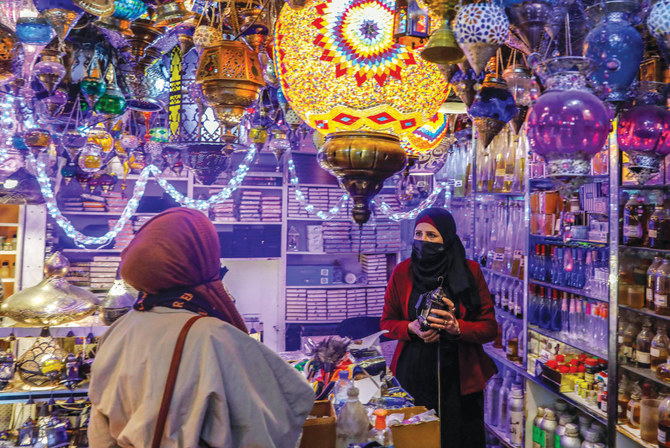GAZA CITY: Using simple materials like cloth, wood, and electric lighting, Ghadeer, 41, runs a Ramadan business producing lanterns in Gaza, which became the main source of income to her family.
The month of Ramadan is a good source of income for Ghadeer, who lives in Khan Younis in the south of Gaza, and for other women who manufacture lanterns, enabling them to provide for the basic needs of their families in light of their deteriorating economic reality.
Ghadeer started her small home project five years ago, and thinks that her talent for manufacturing handicrafts opened the door for her to start making Ramadan lanterns, with the help of her unemployed husband Khaled Sweidan, 44.
The manufacture of lanterns and other handicrafts related to religious and community occasions such as the Hajj and Umrah seasons, weddings and holidays, is the only source of income for the family.
“The financial return is limited and barely sufficient to meet the family’s requirements,” Ghadeer said.
“We used cardboard at the beginning, but today we use more quality raw materials, and I dream of further development in the future.”
Ghadeer has no place to show her work but she uses social media platforms to promote the products. She is proud of the admiration they receive from customers and shopkeepers, even receiving messages from the West Bank, Saudi Arabia and Jordan enquiring about purchases.
Khaled monitors the market, studies its needs and keeps pace with the customers’ requirements to make improvements to the lanterns in terms of shape, size, colors and quality of fabric used.
“Buying lanterns is not important for many in Gaza because of the poor economic conditions, and we are keen to produce quantities commensurate with the needs of the market so that (unsold stock) does not accumulate,” he said
The couple dream of opening a store bearing their name to display their creations, and long for the opportunity to export them abroad.
Local statistics indicate that the percentage of women who are the main breadwinners for their families in Gaza rose from 7 percent in 2007 to 25 percent until the first quarter of 2020.
Hanan Al-Madhoun, 36, had also been waiting for Ramadan to sell her products. Six years ago, Hanan turned a corner of her modest home in the Shati refugee camp, west of Gaza City, into a workshop, where she works about 12 hours a day to help support her husband and three children.
Since the beginning of last year, after her husband lost his job due to the coronavirus pandemic, her work has become the only source of providing for the family.
Fortunately, Hanan has friends in Egypt, a significant market for Ramadan decorations, and Gaza’s artisans follow the Egyptian market more than other Arab markets, influenced by Egyptian rituals and customs. The prices of her popular Ramadan decorations range from four shekels ($1) to 120 shekels.
“I am satisfied with a small profit margin in order to encourage those who want to buy and bring joy to their families,” she said.
















